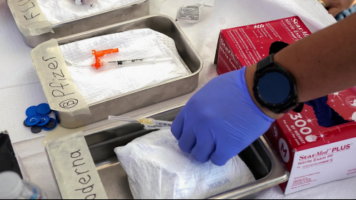COVID-19 News
COVID-19 Update | December 15, 2023
December 15, 2023

This will be the last update of 2023. We will return on January 5, 2024. CBF extends our well wishes to each one of you and your families as 2023 comes to a close. Happy holidays and take care.
The California Biotechnology Foundation is committed to keeping you up to date about COVID-19 testing, treatment and prevention advancements. The following resources track what progress has been made as of December 15, 2023. Notable advancements include:
- A recent study published in Nature Immunology shows that researchers discovered that repeated mRNA vaccines improve immune response against COVID-19.
- Researchers from Columbia University found that the latest mRNA vaccine boosters help protect against the current COVID-19 variants.
- In a study published in Nature Communications, researchers found that the potential use of interferon treatment in the lungs may protect against COVID-19 infections.
Recent News
- IFNγ identified as crucial for reducing pulmonary viral loads in COVID-19, new research shows
News Medical & Life Sciences – December 14, 2023
In a cohort study published in Nature Communications, researchers from the United States of America investigated the role of type-2 interferon in antiviral immunity against severe acute respiratory syndrome COVID-19. They found that an IFNγ response pre-established within the lungs may protect against COVID-19 infection, indicating the potential use of IFNγ as a prophylactic agent in managing COVID-19. COVID-19, caused by SARS-CoV-2, primarily infects lung epithelial cells expressing angiotensin-converting enzyme 2. While interferons of types 1 and 3 are known for their role in antiviral response, the role of type-2 IFN, especially in a COVID-19 infection, is poorly understood. - Getting COVID-19 and flu vaccines at same time is safe
UCLA Health – December 13, 2023
Let’s begin with the COVID-19 vaccine. The days of the two-shot series, which marked the rollout of the vaccine at the end of 2020, are over. The CDC recommends that everyone 5 years of age and older receive a single dose of what is being called the updated vaccine. And while these are sometimes being referred to as “boosters,” a reader — and physician — from Spokane, Washington, points out that’s not exactly accurate. “My understanding is that the new COVID-19 vaccine formulation is not considered a booster,” she wrote. “A person who has never received a COVID-19 vaccine in the past can get the protective benefit of this single vaccination.” Yes, that is correct. The updated vaccine, which protects against the newer variants of the virus, is a stand-alone shot. A single dose offers protection, regardless of previous vaccination status. It is expected that COVID-19 prevention will follow the familiar pattern of the flu vaccine. - A growing COVID-19 variant has taken off this holiday season. How to protect yourself.
USA Today – December 13, 2023
Scientists are narrowing in on the fastest-growing COVID-19 variant, learning more about the strain that has coincided with a rise in cases as Americans head into the holidays. The JN.1 variant now accounts for more than one-fifth of all cases, based on estimates from the Centers for Disease Control and Prevention. In the CDC’s latest Nowcast reporting period, cases involving this mutation make up between 15% and 29% of COVID-19 infections. The variant previously accounted for an estimated 8% of cases. This uptick suggests that JN.1 could be more transmissible and better at slipping past people’s immune systems, the CDC said. - Study Finds COVID-19 Vaccination in Pregnancy Lowers Risk of Preterm Births
Parents – December 11, 2023
While the pandemic may be behind us, we may not want to hear it, but COVID-19 is still hanging around. The risks are very real for pregnant people. But there’s new research that shows promise for those pregnant people who get the COVID-19 vaccine. As researchers who study factors that shape health at birth, Florencia Torche, PhD, Dunlevie Family Professor of Sociology at Stanford University, and Jenna Nobles, PhD, Professor of Sociology at the University of Wisconsin-Madison, soon realized after the onset of the pandemic that one of the most enduring legacies of COVID-19 may be its effect on infant health. Pregnant people are considered a vulnerable population which means COVID-19 can have serious effects on them and their fetuses. Pregnant people are more at risk for preeclampsia, ICU hospitalization, and death, Torche says, and babies are more likely to be born before 37 weeks and need intensive care. “COVID-19 affects multiple biological systems and there are likely several processes in play,” Torche says. - Experimental drug that alters gut microbiome shows promise for long-COVID-19 relief
Center for Infectious Disease Research & Policy at University of Minnesota – December 8, 2023
A randomized controlled trial finds that the synbiotic drug SIM01 relieves multiple symptoms of long COVID-19, or post-acute COVID-19 syndrome. SIM01 contains strains of anaerobic Bifidobacterium bacteria and soluble fibers to alter the gut microbiome and possibly modify immune response. Researchers from the Chinese University of Hong Kong randomly assigned 463 adult long-COVID-19 patients at a single hospital in a 1:1 ratio to receive SIM01 or a vitamin C placebo by mouth twice daily for 6 months. The median interval between infection and random assignment was 4 months. The investigators clinically assessed participants at baseline for symptoms, quality of life, and physical activity level. At 6 months, interviewers administered a 14-item symptom questionnaire to participants and collected blood and fecal samples to assess changes in the gut microbiome and blood cytokines. - The Updated COVID-19 Shot Works on the Newest Variants
Time – December 7, 2023
Every COVID-19 vaccine is a step behind the virus. In the time it takes companies to make the shot, SARS-CoV-2 is already busy mutating into different versions that can evade the immune response produced by it. But even though the latest vaccine targets XBB.1.5, a variant no longer dominant in the U.S., it seems to be doing a decent job at warding off some of the emerging variants. In a study published on the preprint server bioRxiv, scientists led by Dr. David Ho, director of the Aaron Diamond AIDS Research Center at Columbia University, report that the vaccine can generate strong antibodies that can neutralize not just XBB but variants such as HV.1, which now accounts for 31% of U.S. infections, and HK.3, which contributes to half of new infections in Asia (and about 7% in the U.S.). - Repeated mRNA vaccines supercharge immune response against COVID-19, study finds
News Medical & Life Sciences – December 7, 2023
In a recent study published in the journal Nature Immunology, researchers investigated how repeated mRNA vaccinations improve COVID-19 immunity in SARS-CoV-2-naïve and priorly infected individuals. Focusing on the latter cohort, the study evaluated the diversity and concertation in tandem with multiple sequencing analyses of immune cells isolated from the patient’s peripheral blood mononuclear cells. Study findings reveal that sequential vaccination promotes heterogeneous immune cell clonal expansions, with the third mRNA vaccination resulting in almost two times the number of clones as the first vaccination dose. Parallelly, populations of CD8+ T cells substantially increase, thereby better preparing an individual’s immune system to cope with multiple COVID-19 strains. Surprisingly, the presence and severity of COVID-19 infection were directly associated with post-vaccination immunity. - Using both nose, throat swabs boosts sensitivity of rapid COVID-19 testing
Center for Infectious Disease Research & Policy at University of Minnesota – December 6, 2023
In JAMA Network Open, a randomized clinical trial shows that a single healthcare worker (HCW)-collected throat swab had significantly higher sensitivity for COVID-19 rapid antigen testing (RAT) than an HCW-collected nose swab during Omicron predominance, but self-collected nose swabs were more sensitive than self-collected throat swabs among participants with symptoms. For the trial, a team led by Copenhagen University Hospital researchers in Denmark randomly assigned 2,674 people aged 16 and older being tested for COVID-19 by reverse transcription-polymerase chain reaction (RT-PCR) to self- or HCW-collected throat and nasal swabs for RAT in February and March 2022. Four samples (two HCW-collected nose and throat swabs for RT-PCR and two self- or HCW-collected swabs for RAT) were collected per participant at two urban COVID-19 outpatient test centers in Copenhagen, and additional HCW-collected throat and nose swabs were used as the reference standard. - Novel mRNA vaccine GLB-COV2-043 shows high efficacy against COVID-19 variants in early trials
News Medical & Life Sciences – December 5, 2023
In a recent study published in Scientific Reports, researchers examined the safety, efficacy, and immunogenicity of a messenger ribonucleic acid (mRNA)-based vaccine for COVID-19. The COVID-19 pandemic has had a significant impact on the global economy and public health. Despite the introduction of different types of COVID-19 vaccines, the inequitable distribution resulted in greater vaccine coverage across developed nations than in low- and middle-income countries. Thus, equitable access to vaccines is necessary to alleviate the global impact of the pandemic. Previously, the study’s authors provided preliminary data on a COVID-19 mRNA vaccine candidate, GLB-COV2-043, developed by GreenLight Biosciences.
Rely on California Biotechnology Foundation to monitor breaking news and provide updates on the latest advancements in COVID-19 diagnostics, vaccines and treatments.
Stay informed on the latest news and trends on the economic and health benefits of this industry by visiting the new CABiotech.org
If you have any questions about hosting informational briefings for your colleagues serving in the legislature, contact California Biotechnology Foundation Executive Director Patty Cooper at (916)764-2434 or [email protected].


